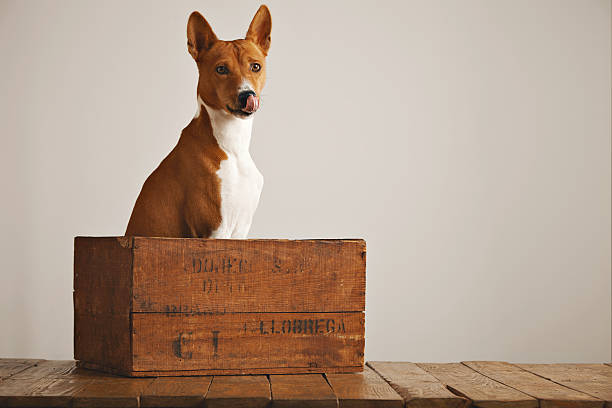Basenjis are a unique and elegant breed known for their cleanliness and lack of a strong doggy odor. However, to keep your Basenji in tip-top shape, proper grooming is essential. In this article, we will explore the step-by-step process of grooming a Basenji effectively. Whether you’re a first-time Basenji owner or looking to refine your grooming techniques, this guide will provide valuable insights and recommendations to keep your beloved companion looking and feeling their best.
1. Brushing and Coat Maintenance:
Basenjis have a short, sleek coat that requires minimal grooming, but regular brushing is still important:
Brush Weekly:
Use a soft bristle brush to remove loose hair and distribute natural oils.
Basenjis shed year-round but tend to shed more during seasonal changes.
Bathing:
Basenjis are generally clean dogs and require infrequent baths.
Use a mild dog shampoo and rinse thoroughly to avoid skin irritation.
2. Dental Care:
Oral health is vital for all dogs, including Basenjis. Here’s how to maintain their dental hygiene:
Brush Teeth:
Brush your Basenji’s teeth regularly with a dog-specific toothbrush and toothpaste.
Dental chews and toys can also help reduce tartar buildup.
Dental Checkups:
Schedule regular dental checkups with your veterinarian to address any dental issues.
3. Nail Care:
Keeping your Basenji’s nails at the right length is crucial for their comfort and mobility:
Trim Nails:
Use dog nail clippers or a grinder to trim their nails.
Be cautious not to cut too close to the quick to avoid bleeding.
Frequency:
Trim their nails every 2-4 weeks, depending on their activity level.
4. Ear Cleaning:
Basenjis have upright ears that require attention to prevent infections:
Clean Gently:
Use a damp cotton ball or a dog-specific ear cleaner to clean the ear’s visible parts.
Avoid inserting anything into the ear canal to prevent injury.
Check for Signs of Infection:
Keep an eye out for signs of ear infection, such as redness, discharge, or odor, and consult your vet if you notice any.
5. Eye Care:
Basenjis have expressive eyes that may need occasional cleaning:
Wipe Eyes:
Use a damp, clean cloth to gently wipe the corners of their eyes.
Be cautious not to touch their eyes with the cloth.
Conclusion:
In conclusion, proper grooming is essential to keep your Basenji healthy and looking their best. Regular brushing, dental care, nail trimming, ear cleaning, and eye care are key components of Basenji grooming.
FAQs about Basenjis, along with detailed answers:
Q1: What is a Basenji dog, and what makes them unique?
A1: Basenjis are a breed of dog known for their unique characteristics. They are a small to medium-sized breed originating from Central Africa. What sets them apart is their lack of a traditional doggy odor and their ability to yodel or “barroo” instead of barking. They are also known for their independent and cat-like behavior.
Q2: What is the history of the Basenji breed?
A2: Basenjis have a rich history dating back thousands of years. They were originally bred in Central Africa for hunting purposes. They were highly valued for their hunting abilities, agility, and independence. In the 1930s, they were introduced to the Western world, and their unique traits gained recognition.
Q3: What is the temperament of Basenjis like?
A3: Basenjis are known for their intelligent and independent nature. They can be aloof with strangers but are loyal and affectionate with their families. They are often described as cat-like because they are meticulous groomers and can have an aloof demeanor at times. Basenjis are also energetic and enjoy physical activity.
Q4: Are Basenjis good with children and other pets?
A4: Basenjis can get along well with children and other pets if they are socialized from an early age. However, due to their independent nature, they may not tolerate rough handling or excessive attention from young children. Proper socialization and training are crucial to ensure they coexist harmoniously with other animals and people.
Q5: What are the exercise requirements for Basenjis?
A5: Basenjis are an active breed and require regular exercise to stay happy and healthy. They enjoy brisk walks, jogging, and playing in a secure, fenced-in area. Mental stimulation is also essential for them, as they are intelligent dogs that can become bored easily.
Q6: Do Basenjis shed a lot?
A6: Basenjis have short, fine coats that shed minimally compared to some other breeds. They are often considered a relatively low-shedding breed, which can be a benefit for individuals with allergies. Regular brushing can help keep their coat healthy and minimize shedding.
Q7: Are Basenjis easy to train?
A7: Basenjis are intelligent but can be independent and stubborn at times. Training them requires patience, consistency, and positive reinforcement techniques. Early socialization and training are crucial to ensure they are well-behaved and obedient companions.
Q8: Do Basenjis have any specific health concerns?
A8: Basenjis are generally a healthy breed, but like all dogs, they can be prone to certain health issues. Some common health concerns in Basenjis include hip dysplasia, progressive retinal atrophy (PRA), Fanconi syndrome (a kidney disorder), and certain skin conditions. Regular veterinary check-ups are essential to monitor their health.
Q9: What is the lifespan of a Basenji?
A9: Basenjis typically have a lifespan of 10 to 14 years. Providing them with a healthy diet, regular exercise, and proper veterinary care can contribute to a longer and happier life.
Q10: Are Basenjis suitable for apartment living?
A10: Basenjis can adapt to apartment living, but they require daily exercise and mental stimulation. They are known for their agility and jumping ability, so apartment dwellers should ensure they have a secure living environment and provide ample opportunities for physical activity.


